- Home
- Peter Benchley
Time and a Ticket
Time and a Ticket Read online
For My Parents Tutto per Tutti gli Sport
Contents
FOREWORD
1
2
3
4
5
6
7
8
9
10
11
12
13
14
15
16
17
FOREWORD
When, on June 15, 1961, Harvard's President Pusey welcomed me into "the society of educated men," I was terrified. For the first time in my life I was a free agent, and the sudden disappearance of the security of school life—the discipline, the small community, and the minor, predictable worries—left me feeling unprotected and alone. The cockiness of the college student left me, and I felt unqualified to face the world on adult terms. Instinct urged me to flee back to the bosom of academe and apply to graduate school.
But I was more fortunate than many of my classmates, for I was to be granted a reprieve from the military and from the necessity of making money. Since I had been unable to secure one of Harvard's many traveling fellowships, my parents and I worked out our own grant, whereby they would support me for a given length of time, and when that money ran out, I would support myself. I could go as far and stay as long as my finances would permit.
After some consideration, a friend, Charles Ravenel, and I decided to go around the world. Ravenel had received a grant from Corning Glass about equal to my Benchley Family Fellowship, and we thought we should take advantage of the chance to travel so extensively, a chance we would most probably not have again. The thought of the dark robes of Cambridge and the glass slivers on the tops of the walls at Oxford depressed us, while names like Kuala Lumpur, Rawalpindi, and Sarawak chimed of adventures unrecorded in Harvard Yard.
I spent the summer and fall in Europe, mostly in Paris, and on the tenth of February met Charlie in Cairo. From Egypt we traveled in Jordan, Israel, Iran, Pakistan, India, Ceylon, Singapore, Malaya, Thailand, Hong Kong, and Japan. In late April we touched down in Honolulu, somehow surviving what the Pan American pilot laughingly described as a "simulated bombing run" from thirty-three thousand feet.
There was no specific purpose to the trip, and this was a great boon. I had no mission, and therefore no limitations. I could look, I could listen, I could see what and whom I wished when I wished, and I could spend as much or as little time in a place as I chose. I knew I could not be as thorough or perceptive an observer as Alsop or Gunther, but I had one thing that they could no longer have: an untutored, and thus open, outlook on the world. I knew so little, had so much to learn, that everything—political, economic, social—could prove new and fascinating to me.
I began the trip with few opinions of my own. It is an unsettling fact that American youth are wretchedly informed about their own nation's problems, not to mention those of the world. Though my ignorance occasionally acted to my advantage, in letting me form my own opinions, I was soon forced to study, to become aware, in order to gain an equal footing with the people I talked to. And, as will happen with study, the more I read, the more I learned; and the more I learned, the more it interested me.
I was fortunate in having opportunities to meet many people unavailable to most tourists. Charlie had contacts with business and government men through Corning Glass, the Harvard Business School, and the Eisenhower Exchange Fellowship program (through one such contact we met Prime Minister Nehru), some friends of mine were at various foreign service posts, and Charlie carried a letter of introduction from the White House, which made it possible for us to talk to officers in American embassies around the world. Also, since we were not traveling with a group, we were foreigners, and obviously so, but we were not a tightly knit American unit whose members clustered, as in a swarm, around a guide. Many times we were accosted in railroad stations, on streets, in restaurants, by people who wanted to practice their English or to argue a political idea, or who were simply curious about Americans.
One night in particular, we were waiting for a train on the station platform in Jaipur, India, en route southwest to Ahmedabad, a dusty, plains-country industrial town. The platform was packed. Elegantly turbaned Sikhs held sleeping babies in their big hands, old women squatted on their heels and peeled tangerines or chewed dark red betel and spat professionally over the edge of the platform. Whole families lay sleeping on their luggage, and always there was the noise of the food and magazine vendors hawking their wares in long, musical Hindi tones. The atmosphere was, above all, one of patience and calm. No one complained, no one spoke sharply to anyone else, no one raised his voice. Already the train was forty minutes late.
Charlie and I edged our way along the platform until we found enough space to set our bags down. A loudspeaker shrieked, first in Hindi, then in English, that the train would be delayed another hour, and Charlie got a book from his suitcase and sat down to read. I saw an empty spot a few feet away, located a frayed copy of Borstal Boy that had sunk into the lining of my raincoat, and curled up next to a steel post.
I read for a while, and then fell asleep. Suddenly I had the feeling that someone was looking at me. I was neither surprised nor uneasy, for Americans are great curiosities in some parts of India, and people often squat down and stare at you for a few minutes, until they get bored and realize that you're not going to do magic for them or exhude blue fire from your ears as you breathe. I looked up, and standing in front of me was a short, thin young man dressed, like most Indian men, entirely in white. He had long black hair and bad teeth, which he showed through a nervous smile. I nodded, assuming that he would say nothing, and went back to Brendan Behan.
"What do you in America think about Communism?" he said suddenly.
The question startled me. "That's like saying 'What do you think about God?' isn't it? It's a little broad."
"All right, do you like Communism, you in America?"
"No."
"I am a Communist," he said, proudly. And then, to make sure I wouldn't hedge on an argument, he said, "The Russians are good people, better than anybody."
"Why is that?"
"They gave us a steel mill."
"Well, the Americans gave you two and a half billion dollars and a steel mill," I said.
"Yes, but the Americans are not good people."
"Why not?"
"They criticized us on Goa."
"I see. Look, if you like the Russians only because they gave you a steel mill, from your standpoint one steel mill should equal one unit of goodness, right?"
"Yes."
"But we gave you a steel mill and two and a half billion dollars, so that's two units, minus one unit to make up for the unit of badness in criticizing you on Goa, which leaves us one unit, or just as much as the Russians."
He was, understandably, confused. "No," he said. "The Russians are good people. The Americans are not good people."
Just then the train arrived, and as it slowed and doors were flung open and bags tossed out through compartment windows, I turned to the young man and said, "You're the most dangerous kind of Communist there is."
He smiled, showing me three black teeth. "What kind is that?" There was a cockiness in his voice.
"The stupid kind," I said, and got on the train. I sat down and looked out the window, and he was standing still, his mouth hanging slightly ajar as if he were looking for something to say. I could feel no sense of victory in shutting him up, for it was a cheap victory and could have done no good. But he was the stupid kind, the unquestioning, follow-the-leader kind, and that is the most dangerous kind, and the whole thought depressed me.
If we had been with a group, we would not have been able to experience this type of opposition, w
ould probably never have become aware of this aspect of Communism. And yet all throughout the East, these are the people to worry about —the ones who will never know another way, who are indoctrinated early and completely, and who have been taught never to question anything. They are happy in their beliefs, for they have nary a doubt. But it is a blind, dulling security. While Americans and British and French can argue principles back and forth, every day more young people, from East Germany to North Korea to Cuba, are being molded and hardened into beings incapable of independent thought.
On my return, it was perfectly natural for me to try to analyze what I had "gotten out of" the trip. I was unable to judge if there had been any basic changes in me—such changes occur slowly and subtly, and are not, really, for one to analyze in oneself. Having been there, I knew for certain that Karachi is not a town in New Jersey. I had developed an interest in, and an awareness of, politics and international goings-on, which a year earlier would have bored me to distraction. And I had come to realize, not without awe, the magnitude and complexity of even the apparently most insignificant of the world's problems. I can't say that the realization made me gloriously broad-minded, but it did make me want to try to understand, to explore more than the one or two obvious sides of a problem.
But most important, I think I learned a great deal more about America by being away from it than I could ever have learned by staying home. I heard people in the NATO countries curse America, and people in neutral countries praise us to the skies. I had lessons in American history from Malayans, learned about our support of the Balfour Declaration from a bitter Arab and a successful Jew, and heard of Arthur Miller's remarriage from a Pakistani. And I saw Americans away from home, Americans stripped of domestic security yet seething with national pride, Americans representing not so much the United States as the Ku Klux Klan, and Americans making friends for America by slogging through miles of mud and sand to help a farmer grow watermelons.
I could come to no general conclusions about the places I saw. The problems, even on the level that I saw them, defied generalization. They vary not only from country to country, but from district to district and town to town. What the region produces, who its leaders are, what its soil is like, what religion the people profess, these and innumerable other factors all determine what can or should be done. I developed opinions on particular situations, and with those that I could not form an opinion on, I tried to lard my confusion with as much knowledge as possible.
It is a world I look forward to with apprehension, gingerly placing an exploratory toe in its icy waters. But it is a world that I consider myself fortunate to have seen at an age when I could still laugh at some of it, be terrified by more of it, and learn from it all.
1
The weather in Paris was perfect. It was early July, before the season of shimmering heat that drives Parisians to the country in August, and as we flew over the city, descending slowly toward the runway at Orly, I could see the yellow reflections of the sun on the white buildings along the Seine.
When I had collected my bags from customs, I strapped them to the top of one of the square black Citroen taxis and stepped inside. Though the air was cool, I was dressed for an Arctic winter, so I was sweating. I rolled the windows all the way down. As the driver, a heavyset old man with deep rivers of wrinkles in his rough face, got in, he looked at the windows and then glared at me. He wrenched the car into gear, and we lurched down the ramp.
I was lying back, eyes closed, basking in the strong breeze, when I heard the driver muttering to himself. I opened my eyes and saw that he was hunched down in his seat, a muffler wrapped twice around his neck.
"What's the matter?" I said.
"Are you a bear from the North Pole?"
"No. Why?"
"Why must you have the windows open so far?"
"I was hot."
"It is not healthy," he said.
"Why not?"
"They should not be open like that. You should have them all open only a crack. That way one gets a cross draft, but a gentle one, and no one gets a chill."
"As you wish," I said, and I rolled the windows most of the way up.
"Thank you," he said, sitting straight in his seat. "It is my liver, you see. One cannot be too careful about one's liver."
I had been given the name of a hotel near St. Germain des Pres. It was a small hotel, I had been told, cheap but clean, and as the taxi turned off the Boulevard St. Germain and climbed the cobblestones on the Rue Monsieur le Prince, the picture I had created in my mind of what the hotel would be like suddenly came true. It nestled between a cafe and a tobacconist off a small square. The streets nearby were narrow and completely without plan—some were one-way up the first half, one-way down the second half. The stores and cafes were small and dark, and people sat at tiny round tables in the sun, drinking Perrier and Coca-Cola. Above an old wooden door hung a sign, "Hotel St. Paul."
"You are very lucky," said the concierge. She was a big woman, with hair that stuck straight out from either side of her head and a broad, friendly smile. "I have but one empty room. But it is one of the biggest rooms in the hotel, and it is, naturellement, one of the most expensive."
I asked how much it was.
''Thirteen hundred francs," she said. Thirteen new francs, two dollars and sixty cents a day.
I said I would take it.
"You will be very happy. The room has three beds and two windows."
Indeed, the room had three beds—two doubles and a single, set across the room from each other on a floor that sloped steeply to the right. I mentioned the angle of the floor.
"C'est rigolo, non?" she said. "One must get used to the room before one comes in late at night having had too much to drink." She laughed and went out.
I kicked my shoes off and jumped onto the bigger of the two double beds. I was ecstatic about being in Paris again, but at the same time apprehensive about having no responsibilities, nothing I had to do, nowhere I had to go, no one to whom I had to answer. Then I began to think that having no responsibilities really meant that I did have one great responsibility, a responsibility to myself to do something, to learn, to meet people, to create responsibilities. It was all too confusing, and I went to sleep.
I had chosen Paris as the stepping-off place and, if there was to be such, the home base for the trip for a number of reasons. It was the only city in Europe that I knew at all. I had spent some time there in 1957, and I felt, if not completely at home, at least not completely lost. I could handle the language without being embarrassed, although my prowess was mostly in accent and almost not at all in grammar. My plans for the summer were indefinite: I might go here, I might go there, I might go alone, I might go with someone, I might even (my recurring dream of glory) be discovered by a beautiful lady who lived in a chateau and taken as her lover for the summer.
Paris is a fine place to wait while making up one's mind —about anything. I was waiting there trying to decide where to go. During the war, the French army waited there so long trying to settle on a course of action that they found themselves occupied. German officers waited there trying to decide where the Allies would land, and they found themselves invaded. Even in Caesar's time, armies would stop in the city, then known as Lutece, to get their breaths and decide whom to conquer next.
The life is conducive to leisurely pondering, especially in the summer. I would get up early and have breakfast at a small cafe on the Odeon. I would walk down St. Germain and cross the river by the Assemblee Nationale, stopping to lean on the rail of the bridge and gaze at the boats and barges that eased their way upriver. On the right bank, each day I would try a different method of crossing the perilous Place de la Concorde, where the traffic speeds around in circles and peels off into the many streets that lead off it. I walked up the Grands Boulevards, past the Madeleine, and stopped at the Cafe de la Paix to have a glass of orange juice and stare at the people who were staring at the people who were staring at the people—whole lives
have been spent at this Parisian sport of people watching. Sometimes, if I was feeling energetic, I walked all the way to Montmartre and stood on the balcony by Sacre Coeur, looking down on all of Paris. Otherwise, I walked down the Rue de Rivoli or by the river's edge and over the bridge to the He St. Louis, where one can spend days poking around in seventeenth and eighteenth century courtyards. I had lunch in one of the cafes on the Boulevard St. Michel. If I had any business to attend to, such as filling out the myriad papers that accompany the purchase of a car, I did that in the afternoon. If not, I bought a book and sat for hours at a sidewalk table, nursing one drink. Or I stopped by at the American Express to see if I had any mail or if any of the people I was half expecting had arrived.
At night, if I was not supping with one of the few people I knew in Paris, I ate at one of the fine, inexpensive restaurants on St. Germain. After dinner I walked some more, looking at the parties that overflowed the restaurants, pouring glass-clutching people into the streets, or I bought a paper and sat at the Deux Magots and drank brandy, not reading so much as listening to the conversations around me. On such a night I rarely went to bed after midnight.
One night, I was walking up Rue Monsieur le Prince toward the St. Paul, yawning and stretching and luxuriating in the warm air, when I was suddenly clasped on both shoulders by two huge hands.
"You're a dead man," said a voice, and for a moment I believed him. Then I was spun around and found myself staring into the face of an old friend, Bob Resky, with whom I had made vague plans about possibly touring Europe.
Resky is not a big man, under six feet and small-boned. Like myself, he was jumped a grade in grammar school and was graduated from Harvard at twenty. Unlike myself, however, he skipped a grade because he was brighter than his classmates. I was just bigger. Although he is an excellent swimmer and an enthusiastic wrestler, he has—again like myself—an interest in the more sedentary pleasures. He has an open, almost effusive manner with people he likes, and when he assumes an ultrasophisticated, blase air, it is more to amuse himself than to create a serious impression. He has a quick mind and, when he wants to use it, a savage, biting tongue.

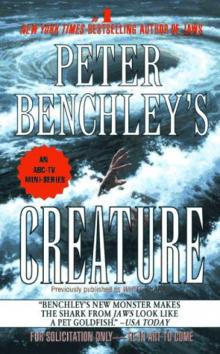 Peter Benchley's Creature
Peter Benchley's Creature The Island
The Island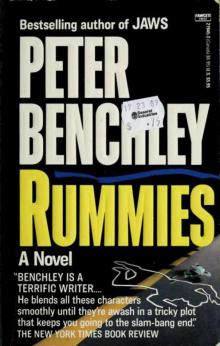 Rummies
Rummies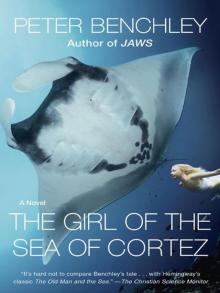 The Girl of the Sea of Cortez: A Novel
The Girl of the Sea of Cortez: A Novel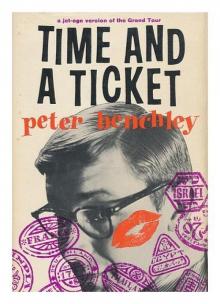 Time and a Ticket
Time and a Ticket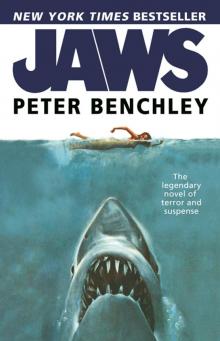 Jaws
Jaws The Deep
The Deep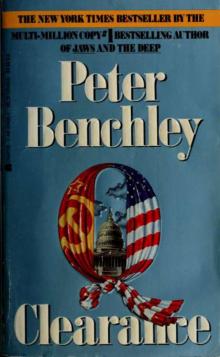 Q Clearance
Q Clearance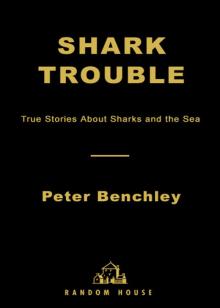 Shark Trouble: True Stories and Lessons About the Sea
Shark Trouble: True Stories and Lessons About the Sea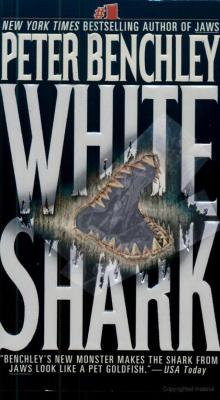 White Shark
White Shark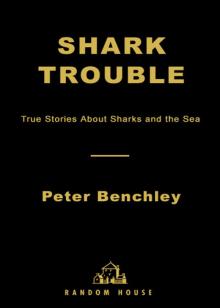 Shark Trouble
Shark Trouble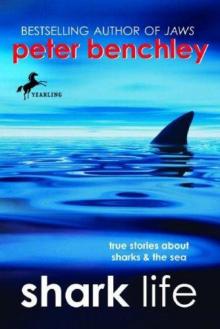 Shark Life: True Stories About Sharks & the Sea
Shark Life: True Stories About Sharks & the Sea